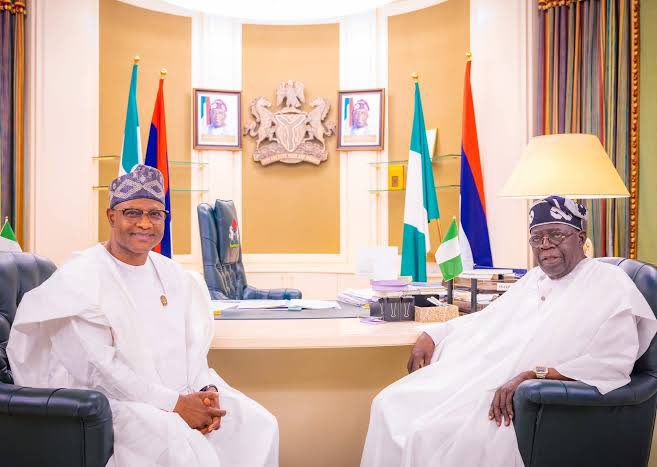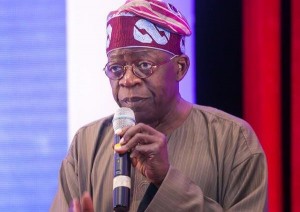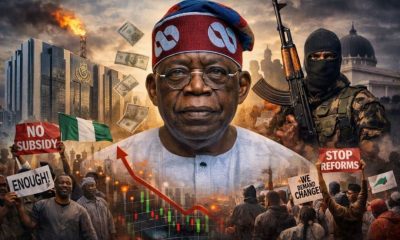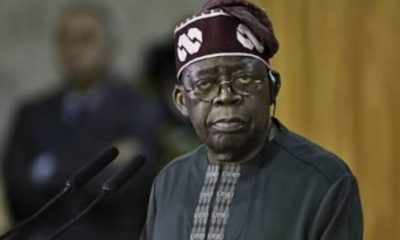Politics
Tinubu and Osinbajo: The true story of how they met

Tinubu and Osinbajo: The true story of how they met By Bayo Onanuga
I never wanted to write this story but I was inspired to do so today, following Buba Galadima’s interview with the Punch on Monday. Buba struck a chord when he spoke about the issue of trust in the relationship between Bola Ahmed Tinubu and Vice President, Professor Yemi Osinbajo.
You think Osinbajo should have given up his presidential ambition for loyalty to Tinubu?, Buba was asked.
He replied: “If he doesn’t, can you now trust him? If you look at how Osinbajo came with Tinubu and he’s now contesting against Tinubu who brought him, how safe would you be to work with such a person?
“If the man who did all this to someone who made him commissioner, made him this, made him that and he is now fighting him. You will now want to fight for him now, what would be your status later in life with him?”.
Just like Buba, I feel strongly that Osinbajo has grossly violated the trust that ordinarily should exist between him and Tinubu.
Contrary to the stories in the social media, I was the one God used to bring Osinbajo into Tinubu’s circle in January 1999.
Tinubu had just won the election as governor of Lagos State and days after, we met on the 6th floor of Kresta Laurel at Maryland, which Otunba Gbenga Daniel donated for our use. On this day, Tinubu shared with us some of the ‘certain’ appointments he intended to make. Those who were at the meeting were Otunba Daniel, Dele Alake and I. Tinubu sat at the head of the table as he said he would make Rafiu Tinubu the Lagos State Head of Service. We argued over this and he justified the planned appointment by saying that Rafiu, who is now late, was a senior permanent secretary in the Lagos Civil Service.
“Attorney-General will be Bayo Oriola”, Tinubu said.
I shot back and said: ” I have a better person for you”, my exact words. Tinubu was startled by my interjection.
“Who is that,” he asked.
“He is a Law Professor and the man who drafted our company’s MOU. He crafted it in a brilliant way that protected us from the founding partners. Without this, the other shareholders would have thrown us out”, I explained.
I also said Osinbajo had worked with Prince Bola Ajibola, who was the Attorney-General and Minister of Justice under President Babangida.
Dele and Otunba Daniel did not oppose my nomination, surprisingly. Tinubu also appeared eager to meet the “wonder lawyer” that I have just sold to him, to replace a man, who had served as the lawyer to the campaign.
“Go and bring him”, Tinubu said.
Before the meeting ended, Tinubu also settled on his nominee for Information Ministry. It was to be Dele Alake and I said I would return to my office to continue journalism.
After the meeting, I went to Osinbajo’s house in Ogudu to invite him to meet the new governor, Bola Tinubu. I remember entering the apartment from the kitchen. The wife was there when I delivered the message and left the house with him, later.
I have never published this story before and hereby want to apologise to my namesake Bayo Oriola, for blocking what should have rightly been his entitlement, going by the role he played during the campaign. I hope Oriola would have the heart to forgive me.
This event happened 23 years ago. Thus a few days ago, I asked Alake to fill the memory gap. Here is what he sent to me from the U.S.
“I remember that day very well. I had actually mentioned Jebby ( Osinbajo’s nickname) to Asiwaju before that meeting. He said we’ll see. You can ask Asiwaju himself. Which was why I didn’t object when you mentioned him at the meeting because it reinforced what I had told him.
“My mentioning Jebby’s name was solely because we were classmates in Igbobi college – same classroom, together with Tunde Fowler, Ade Ashekun, (the one he made ambassador to Canada) and Tunde Durosinmi Etti, former Commissioner under Ambode. Jebby and I were also attending the same church, Baptist Sheperd Hill Obanikoro, and his father’s house in Obanikoro not far from my dad’s house in Pedro road at the back of the church.
“After you mentioned his name that day , Asiwaju still asked Gbenga Daniel again and Gbenga also okayed him.
” Asiwaju knows all these. You were the one that mentioned him openly at the meeting while I had mentioned him a day or two before in private and Asiwaju again confirmed his name from Daniel.
“When Asiwaju told me he also asked about him from Daniel I then told him that Daniel, myself and yourself were contemporaries in UNILAG and he laughed that we were doing Akoka solidarity”.
Looking back now, did I regret what I did in January 1999. Yes, I would say I have some regret, especially since my action hurt Bayo Oriola. And my apology to Oriola once again. I could not have foreseen today’s turn of events between Tinubu and Osinbajo, who I nominated to be justice commissioner.
news
Journalists for Good Governance Shines Searchlight on Local Government Administration

Journalists for Good Governance Shines Searchlight on Local Government Administration
…Calls for Accountability in Nigeria’s Grassroots Governance
LAGOS, Nigeria — A civil society coalition known as Journalists for Good Governance(JGG) has intensified public debate on transparency and accountability within Nigeria’s local government system, urging media professionals, civil society actors, and citizens to hold grassroots leaders accountable.
Speaking an event in Lagos recently, the acting chairman of the society, Comrade Bunmi Obarotimi said that despite reforms such as the Supreme Court’s 2024 ruling granting financial autonomy to all 774 Local Government Areas (LGAs), systemic challenges continues to hinder effective service delivery and responsible stewardship of public funds.
“Local governments are the closest tier of government to the people — yet too often they remain the least transparent. Without civic oversight and vibrant media, promises of autonomy ring hollow.” the acting chairman said.
The Journalist for Good Governance emphasised crucial roles that journalists can play in uncovering discrepancies in council spending, flagging poor service delivery, and educating citizens on their rights. Their call comes amid wider efforts by media and civic organisations to bridge accountability gaps. The civil society initiatives had previously launched monitoring campaigns to track local government expenditures and have been quietly advocating for transparency in how public money is deployed.
The leaders of the Journalists for Good Governance (JGG) highlighted the importance of physical assessment and citizens engagement on projects to boost people’s confidence, urging local councils to adopt open data platforms and proactive information dissemination in compliance with the Freedom of Information Act. Experts say the majority of LGAs currently lack operational websites or digital portals, further limiting public scrutiny.
The Journalists for Good Governance initiative aligns with sustained advocacy by civil society groups and governance experts calling for a collective approach to strengthening democratic accountability, and has decided to engage in critical and holistic assessments of how Local Governments is being run and the impact and quality of projects they embark-on and to address deficits in transparency and public trust.
Meanwhile, some state governments have signalled support for improved community engagement. In Lagos State, authorities reiterated a commitment to enhancing community media platforms as vehicles for civic participation and accountability at the grassroots level.
The renewed spotlight on local government administration has reignited public debate over fiscal responsibility and priorities. Controversies such as the widely criticised Adamawa council chairmen’s wives trip to Istanbul — which drew public outrage for perceived misuse of public funds — underscore why watchdog groups say stronger oversight mechanisms are urgently needed at the grassroots.
Citizens and activists have welcomed the journalists’ initiative, calling for sustained media engagement that goes beyond headlines to influence policy and accountability reform.
The civic rights advocates note that real change will require robust legal frameworks, a free press, and empowered communities equipped to demand transparency at every level of governance.
As Journalists for Good Governance mobilises its members, the coming months are likely to see heightened media attention on grassroots administration — from council budgets and service delivery to the enforcement of public information laws and digital transparency initiatives.
Politics
Gov. Dauda Lawal commissions projects in Anka LGA, Commits to Sustainable Development

Gov. Dauda Lawal commissions projects in Anka LGA, Commits to Sustainable Development
The Executive Governor of Zamfara State, Dr. Dauda Lawal, has reiterated his administration’s steadfast commitment to guiding Zamfara State towards sustainable development by inaugurating and initiating a series of pivotal projects in the Anka Local Government Area.
Among the key undertakings announced are the comprehensive reconstruction and modernization of the Emir of Anka’s palace, signaling a revitalization of traditional leadership; the initiation of work on the crucial Anka–Abbare Road, which is expected to significantly improve connectivity; and the construction of a new Local Government Secretariat.
Additionally, the projects encompass the establishment of dedicated offices for the Hisbah Commission and the Community Protection Guards, alongside the reconstruction of the Safe School in Anka, emphasizing the administration’s focus on enhancing educational infrastructure.
During the commissioning event, Governor Lawal highlighted that these projects are a fulfillment of commitments made during his campaign, aimed at transforming the local landscape by improving infrastructure, stimulating economic growth, bolstering public service efficiency, and enhancing the capacities of security agencies. He called for a collective effort from the community to ensure proper maintenance of these facilities, underscoring the shared responsibility in preserving public assets.
Governor Lawal shared that similar projects have also been inaugurated in Tsafe, with plans for upcoming projects in Kaura Namoda, Moriki, Bungudu, Bukkuyum, and Zurmi, all expected to be completed and inaugurated by the year’s end. This ambitious timeline reflects the administration’s urgency in addressing the development needs of various regions within the state.
In his remarks, the governor urged residents and local traditional institutions to collaborate closely in maintaining the newly commissioned structures and supporting the overarching objectives of his administration. “I stand here in Anka today to honor our commitments to the people of Anka Local Government and all of Zamfara State. The official opening of the new palace for the ‘Sarkin Zamfaran Anka’ and the Zamfara State Council of Chiefs is a significant milestone that wraps up today’s agenda,” he stated.
Governor Lawal emphasized the strategic importance of the Anka–Abbare Road, describing it as a critical artery that will not only enhance access to remote areas but also stimulate economic activities and generate multiplier effects throughout the local economy. He articulated the necessity of providing a conducive work environment for civil servants, affirming that the new local government secretariat and dedicated offices will significantly contribute to strengthening law and order within the state.
“Education is the cornerstone of any thriving society. Our focused initiatives are oriented towards fostering a safe, secure, and supportive environment for our students. I am also proud to announce the completion and commissioning of the reconstructed SAFE School Anka today,” he remarked, reaffirming the administration’s dedication to education.
The governor further noted that the commissioning of the Emir’s Palace serves to restore the historical prominence of traditional institutions, which he regards as pivotal custodians of the region’s culture and heritage. He underlined the administration’s awareness of the invaluable role that these institutions play in fostering the state’s growth and emphasized the necessity of aligning development projects with cultural values.
In conclusion, the governor mentioned that after the successful commissioning in Anka and Tsafe, future projects in Kaura Namoda and Moriki will follow suit, while those in Bungudu, Bukkuyum, and Zurmi remain on track for completion and official commissioning before the year concludes.
news
GEN CHRISTOPHER GWABIN MUSA SUPPORT INITIATIVE HAILS GOVERNOR UBA SANI’S APPOINTMENT AS RENEWED HOPE AMBASSADOR

GEN CHRISTOPHER GWABIN MUSA SUPPORT INITIATIVE HAILS GOVERNOR UBA SANI’S APPOINTMENT AS RENEWED HOPE AMBASSADOR
The Gen Christopher Gwabin Musa Support Initiative (GCGMSI) has extended its warm congratulations to His Excellency, Mallam Uba Sani, the Executive Governor of Kaduna State, following his recent appointment as a Renewed Hope Ambassador and Deputy Director-General for Party Outreach, Engagement, and Mobilisation by the All Progressives Congress (APC).
This felicitation was formally conveyed in a statement signed by the Initiative’s Convener, Ibrahim Dahiru Danfulani, Sadaukin Garkuwan Keffi/Betara Biu, and disseminated to the press.
The statement highlighted that the Grand Patron of the GCGMSI, His Excellency General Christopher Gwabin Musa, OFR, Minister of Defence of the Federal Republic of Nigeria, received the news of the appointment with great pride but without surprise. According to the statement, General Musa expressed unwavering confidence in Governor Uba Sani’s proven capability and salient leadership qualities, affirming that the Governor is eminently equipped to deliver on every task entrusted to him.
The Grand Patron further extended profound appreciation to the President and Commander-in-Chief of the Armed Forces, His Excellency Asiwaju Bola Ahmed Tinubu, GCFR, for recognising and finding Governor Uba Sani worthy of this critical national assignment. The appointment, which takes effect immediately, was made by the President in his capacity as the leader of the APC, citing the Governor’s exceptional organisational abilities and strategic acumen.
In his new role, Governor Sani is tasked with working in close collaboration with the Director-General of the Renewed Hope Ambassadors and the party hierarchy, including the National Chairman of the APC. His primary mandate is to ensure harmony, inclusiveness, and strategic coordination across all levels of the party’s mobilization and engagement architecture, a vital function for advancing the political agenda.
Demonstrating its commitment to national service and effective governance, the GCGMSI, under the direct directive of its Grand Patron, General Musa, has officially mobilised its formidable structure. The Initiative has pledged the full deployment of its extensive network, seasoned personnel, and robust operational framework to assist and support Governor Uba Sani in the successful execution of his new responsibilities.
The Gen Christopher Gwabin Musa Support Initiative, renowned for its disciplined organisation, widespread grassroots penetration, and capacity for large-scale civic mobilisation, stands ready as a pivotal force. This move underscores the GCGMSI’s pivotal role as a key support system for national development initiatives and its unwavering dedication to fostering unity and progress under the Renewed Hope agenda.
-

 celebrity radar - gossips6 months ago
celebrity radar - gossips6 months agoWhy Babangida’s Hilltop Home Became Nigeria’s Political “Mecca”
-

 society6 months ago
society6 months agoPower is a Loan, Not a Possession: The Sacred Duty of Planting People
-

 society5 months ago
society5 months agoReligion: Africa’s Oldest Weapon of Enslavement and the Forgotten Truth
-

 news6 months ago
news6 months agoTHE APPOINTMENT OF WASIU AYINDE BY THE FEDERAL GOVERNMENT AS AN AMBASSADOR SOUNDS EMBARRASSING









